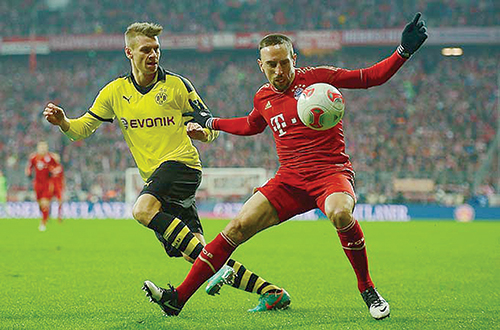Championship games can rarely be relied upon to provide the memorable and evenly matched encounters that fans long for. Any diehard can relate to the experience of sitting down to watch a thoroughly hyped Super Bowl only to get bored sometime in the second quarter as another one-sided blowout becomes the backdrop to a string of Budweiser commercials and a musical halftime show.
Champions League review

Championship games can rarely be relied upon to provide the memorable and evenly matched encounters that fans long for. Any diehard can relate to the experience of sitting down to watch a thoroughly hyped Super Bowl only to get bored sometime in the second quarter as another one-sided blowout becomes the backdrop to a string of Budweiser commercials and a musical halftime show. At least in the case of (American) football, those ancillary bits serve as a helpful distraction in the event that Team A winds up beating the living crap out of Team B for three uneventful hours.
Soccer, despite laying claim to the vast majority of sports fans outside of this country, often suffers from the same dilemma. Chelsea’s shoot-out victory in the Champions League final last year was a welcome exception to what have generally been exceedingly dull affairs (Barcelona’s two dominant victories over Manchester United in 2009 and 2011 immediately come to mind).
But fans are always ready to believe again, and so the instant that Bayern Munich and Borussia Dortmund booked their spots in Saturday’s final it became impossible to imagine anything other than a competitive and thrilling championship. The match marked the first time in the history of the tournament that two German squads faced off for the title, and it was bolstered by the contrast in styles and the tense recent history between them.
Bayern Munich, nicknamed “FC Hollywood” for their attractive, eye-catching style of play, are the undisputed juggernauts of German soccer. Laden with cash and among the most successful clubs of the past few years, Bayern seems headed for an extended run of soccer supremacy after this season’s trophy-rich campaign. Borussia Dortmund, on the other hand, are still getting acclimated to the spotlight. Based in a hard-working steel- and coal-mining town in western Germany, Dortmund were the breakout stars of this year’s Champions League. The team features a host of talented young stars and is led by manager Jurgen Klopp, a former TV analyst fondly remembered for his frequent profanity on the air.
Outside of Munich and the Bavarian region, Bayern are largely hated by fans of the sport, mainly because of their reputation as talent poachers who spend their offseasons stockpiling young upstarts within the German Bundesliga as a matter of ritual. Amazingly, this very storyline played out just weeks before the Champions League final, when it was revealed that Mario Gotze, a rising star of the game and one of the catalysts for Dortmund’s success, would be joining Bayern’s star-studded lineup next season after being bought out of his contract for a deal worth 37 million euros.
Dortmund didn’t even have the benefit of one last run with Gotze as the young midfielder sat out the game with an injury, and the team was considered a heavy underdog as a result. Just minutes into the match, however, it became abundantly clear that Dortmund was not willing to be intimidated. They repeatedly peppered shots at Bayern’s goal in the first half, and it took an inspired performance by goalkeeper Manuel Neuer to keep them from taking an early lead. Bayern had chances as well, the best of which came in the 37th minute when Dutch winger Arjen Robben snuck through the defense but was unable to beat Dortmund goalkeeper Roman Weidenfeller.
The second half began in much the same way as the first, with Dortmund maintaining their fierce attack while Bayern tried to work their way into the match. Bayern’s breakthrough came at last in the 60th minute, when Robben received the ball in the penalty box and danced his way past Wiedenfeller before neatly crossing it to striker Mario Manzukic, who slotted it home. Dortmund responded in dramatic fashion in the 68th minute after being awarded a penalty kick on a challenge in the box and midfielder Ilkay Gundogan stepped up to bury it in the back of the net, drawing the game level.
The next several minutes became increasingly frenetic, with Bayern gradually exerting their will on the game. Dortmund defender Neven Subotic produced an absolutely incredible goal line clearance in the 72nd minute, sliding from out of nowhere to send a sure goal out of bounds. But Dortmund’s last stand against Bayern was ultimately undone in the 89th minute, when the ball found its way to Robben once again—and this time the crafty Dutchman, one-on-one with the goalkeeper, placed an early shot into the right side of the net. The late score marked a fitting end to one of the best final matchups in recent memory, one that should keep soccer fans satisfied through the long offseason. Sometimes, a championship lives up to the hype.






